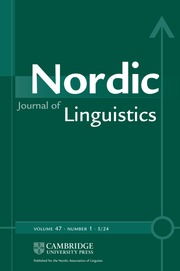Article contents
Three Perspectives on Swedish Indefinite Determiners
Published online by Cambridge University Press: 22 December 2008
Abstract
This article investigates the meaning and use of singular indefinite determiners in Swedish, in particular the way in which the existential determiner någon/något contrasts with the indefinite article en/ett in different contexts. The problem is approached from three different perspectives, the first being a contrastive Scandinavian perspective, where the Swedish data are reviewed in the light of contrastive data from the closely related languages Danish and Norwegian. Secondly, corpus data are used to substantiate the results of the contrastive analysis both quantitatively and qualitatively. The last section adopts a more theoretical perspective and tries to present a formal semantic analysis of the two determiners under study, drawing on typological work on indefinites and studies of the historical development of indefinite determiners.
- Type
- Research Article
- Information
- Copyright
- Copyright © Cambridge University Press 2002
References
REFERENCES
- 3
- Cited by


